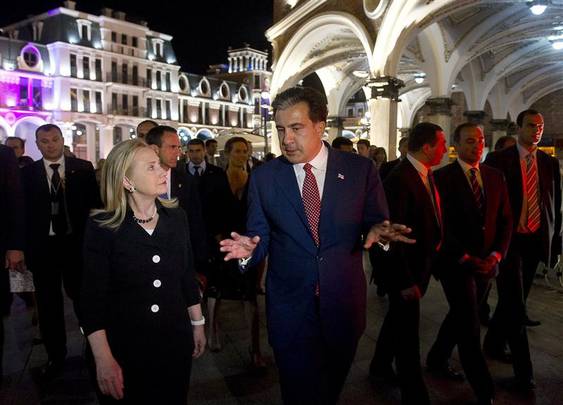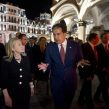
Clinton in Georgia: Political Process or Policy Objectives?
Publication: Eurasia Daily Monitor Volume: 9 Issue: 111
By:

US Secretary of State Hillary Clinton’s visit to Georgia delivered some potentially significant results (see EDM, June 11). These look, however, not nearly as impressive as Clinton’s lavish praise for Georgia’s performance on economic reforms.
Two features stand out in Clinton’s praise. First, it credits Georgia’s top performance to nobody in particular: an abstract country of Georgia or perhaps the hand of Providence. It fails to identify the team that has actually implemented these reforms and is committed to their continuation. Such an omission in turn avoids the question of whether the reforms could continue after upcoming elections under a different team with no record on economic reforms. Second, Clinton upped the ante: after portraying Georgia as an economic-reform “model” for the entire world (see below), she wanted Georgia to be a “model” on democratic elections also.
On the reforms, Clinton declared: “Georgia is now asked by people all over the world to send experts to talk about how to reform economies” (Georgian Public TV, June 6). “Your progress has been noted worldwide. […] Your economic reforms have won international praise and rising standings in global business rankings” (Clinton at the US-Georgia Strategic Partnership Commission, State Department press release, June 5). “New and struggling democracies are looking to Georgia. They want to know how Georgia has accomplished so much in such a short period of time” (Clinton press conference, State Department press release, June 5).
But Georgia is being asked also to become a “model” on the conduct of elections in 2012 (parliamentary) and 2013 (presidential): “We hope that these will be model elections” (Clinton news conference, State Department press release, June 5); “A valid electoral outcome in parliamentary and presidential elections will further Georgia’s reputation as the kind of model that we want to see other countries follow” (Clinton on Georgian Public TV, June 6).
Afghanistan is also a test of Georgian exceptionalism. Georgia is now a leading non-NATO troop-contributor to US-led operations there in per-capita terms, and is set to become the overall second-largest (after the US) per-capita contributor during this year. Clinton duly expressed gratitude during her visit.
Meanwhile, the Obama administration sounds agnostic about Georgia’s political contenders and the outcome of elections. In what appeared to be prepared remarks, Clinton expected Georgia’s elections to “result in a fully democratic transition” and to “complete a democratic transfer of power in 2013” (State Department press release, June 5).
US President Barack Obama had introduced the “transfer-of-power” talking point when receiving Georgian President Mikheil Saakashvili at the White House in January 2012. The State Department used this talking point for a while, then decided to drop it; but it reappeared in Clinton’s remarks (presumably an inter-agency effort) during her visit. “Transition” and “transfer of power” can easily be misinterpreted as a calculated US encouragement to the opposition, or even as pre-judging the elections (and in a more sinister misinterpretation, as a regime-change tribute to the administration’s Russia Reset). But it seems more likely that superficial speechwriting and editing may be responsible for these confusing formulations.
Asking Georgia simply to “hold free fair elections” and that “all parties and all candidates should respect the political process” (as Clinton also put it) sounds more rational than asking Georgia to become the “model” – and moreover, to do so instantly in the 2012 elections.
Exaggerated expectations proved counterproductive when the Bush administration portrayed Georgia as a “beacon of democracy.” That and the “model-elections” rhetoric are equally ahistorical. They scarcely add to the government’s already strong motivations to perform well; but they can lead to disappointment when performance does not match the artificially raised expectations.
Realistically, Georgia should not be expected to hold “model” elections in 2012 and 2013. In light of the record thus far, Georgia can be expected to hold less-than-perfect but correct elections reflecting the voters’ choice, and continually to improve from one electoral cycle to the next.
Georgia’s presidential election in January 2008 received a passing grade from a US-led observation mission; the May 2008 parliamentary elections showed further improvements. But the radical opposition rejected both outcomes and wreaked havoc on Tbilisi with protest demonstrations in 2008-2009. The local elections, held country-wide in 2010, were assessed as basically correct by all players (except marginal pro-Moscow politicians), and almost all accepted the outcome. Soon enough, however, the billionaire Bidzina Ivanishvili launched a regime-change campaign in 2011 and has gathered a number of opposition groups into his coalition.
In the run-up to Clinton’s visit, Ivanishvili announced that he was seeking a one-on-one meeting for himself with the US Secretary of State. When informed that Clinton would receive him in a small-format meeting with other opposition leaders, Ivanishvili told Georgian and international media that he refused to sit alongside the “false opposition” and “Saakashvili’s agents,” as Ivanishvili describes the parliamentary opposition. Instead, three of Ivanishvili’s allies and two parliamentary opposition leaders participated in the meeting with Clinton (Civil Georgia, May 28, June 5).
Uniquely in Georgia, contenders for political power regard the United States as an external source of legitimacy and appeal. Politicians’ attitudes may be value-based or tactical, from case to case; but they are in various ways factoring the United States into their electoral strategies. The US is accepted in Georgia as the external referee of the country’s internal politics. This role, however, focuses on issues of political process, more than on policy issues (see EDM, April 4).
Some in Washington assume (The National Interest, June 4) that Georgia’s elections require the US to promote the electoral “process” per se, to which the overriding value is ascribed, instead of a policy program with specific objectives, a political force behind that program, and the pursuit of a strategic outcome. Some US officials argue defensively that the United States applies this approach not only in Georgia, but everywhere (i.e., indiscriminately). When put in those terms, this approach will elevate process over policy and outcome.
Herein lies an internal contradiction in US policy. Judging by the rhetoric during Clinton’s visit, the United States acknowledges Georgia’s “model” performance and expects more of the same; but it sounds agnostic or indifferent about the elections’ outcome, while a Russian-made billionaire pursues the goal of state capture at the head of a past-oriented team.




